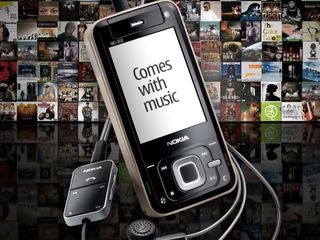
Nokia has renewed its attack on Apple's iTunes Store with a new service that will see music come pre-loaded onto new mobile phones from the company. The Comes With Music service will be rolled out from mid-2008 and will enable you to keep the songs even after you stop paying for the year long subscription. But there is catch - and it's a pretty big one. First, this from Nokia:
"We set out to create the music experience that people are telling us they are looking for - all the music they want in the form of unlimited downloads to their mobile device and PC," Anssi Vanjoki, executive vice president and general manager, multimedia at Nokia, said in his keynote speech this morning.
"Even if you listened to music 24 hours a day, seven days a week, you would still only scratch the surface of the music that we're making available. Comes with Music fulfils our dream to give consumers all the music they want, wherever they want it, while rewarding the artists who create it." Sounds good, so what's the problem?
Music with strings
To give Comes With Music a fighting chance against iTunes, Nokia has signed up to Total Music - an alternative music service being developed by Universal Music Group (UMG), Sony BMG and Warner Music Group (WMG). Total Music uses a subscription-based model with a difference - it enables you to keep the music you download. It even offers a fair amount of flexibility over how you can use it - you can copy tracks to your PC and up to three other handsets, for example. Now here comes the 'But':
Firstly, UMG - which is the only label providing music initially - stands to get a cut of every Comes With Music handset that Nokia sells. This is similar to the music tax it also levies on the Microsoft Zune (around five per cent). It's not clear yet whether or not other labels will also want to levy their own charges against Nokia - costs that will then be passed on to you - to secure the rights to other music content.
Secondly, every track you buy will be wrapped in Windows PlaysForSure DRM, something even Microsoft has abandoned for the Zune. That means Comes With Music tracks won't work on the iPod or iPhone - which is just as anti-competitive in its way as the so-called iTunes-iPod 'monopoly' is.
Thirdly, although you get to keep the songs you download in the first year of your subscription, the real kicker comes in year two. To keep downloading tracks you have to buy a new handset, according to Ars Technica, and so pay the levy again, etc, etc.
Get daily insight, inspiration and deals in your inbox
Get the hottest deals available in your inbox plus news, reviews, opinion, analysis and more from the TechRadar team.
That may not be a problem if you buy a new mobile every year anyway, but then that all depends on what Nokia regards 'competitive' pricing as: it could mean 'competitive with the iPod and iPhone' which may mean that you'll end up having to spend up to £270 to get your hands on a new one.
Fourth, if you want to archive the tracks to CD, you'll have to pay again.
Can you trust Total Music?
As we've already explained, Nokia's Comes With Music is part of Total Music, an music biz initiative designed to take on Apple, the iPod and iTunes. The problem is that two of the 'big three' labels that have signed up so far have a good track record when it comes to looking after their customers:
UMG's refusal to renew its long-term contract with Apple in July was put down to a number of reasons: none of which are particularly music fan-friendly: first, some record labels allegedly wanted Apple to raise prices on new releases; second, some labels also wanted tracks to be offered on an album-only basis - 'want one track? Then buy the whole album'; third, UMG may have been upset by the Apple-EMI deal which saw DRM-free tracks appear on iTunes. ironically UMG now offers DRM-free music on almost every download store apart from iTunes.
Sony BMG's ill-fated decision to include a DRM rootkit on its music CDs in 2005 showed it not only it to be incompetent, but arrogant and ignorant as well. And Sony evidently still thinks DRM is a good idea - it's currently the only hold-out in a battle with retail giant Wal-Mart over DRM.
Only Warner Music Group has had a recent change of heart. It has stopped berating Apple for not charging music fans more for new releases, and is now embracing a flat-rate pricing policy instead. It also still believes in DRM.
Most Popular

